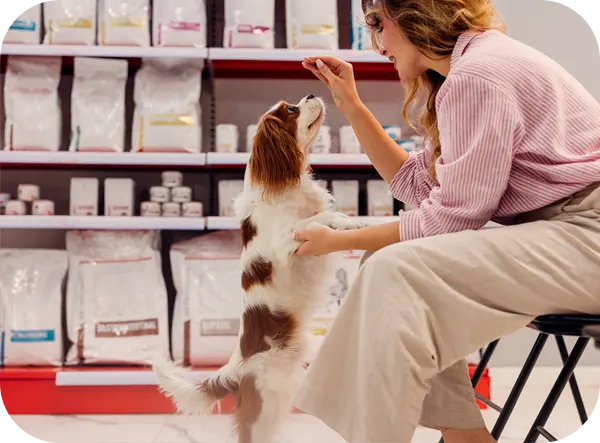Your line of work is unique, so we’ve tailored an insurance policy that best suits the needs of your profession to better protect your reputation and livelihood.
Principle partner of


If you're forced to defend your professional reputation, you'll want the best support behind you.
Our policies include three types of insurance in one designed specifically for veterinarians combining: professional indemnity insurance, public liability insurance, and product liability insurance.
Product liability
Insurance cover for liability for injury or property damage caused by goods sold or supplied by you. This can include cover for clients getting sick or injured from products you provide for example; Animal medications, flea treatments, bandages and other products.
Extra benefits of this insurance policy
Nil basic excess on liability claims
Run-off cover which protects you when you’ve ceased practising permanently
Cover for legal costs and expenses associated with complaints to your registration body, disciplinary proceedings or a coronial inquiry
Provides a 21-day cooling-off period, allowing you to change your mind after purchasing coverage
Ongoing education through our RiskHQ, providing you with relevant and informative information on the risks that matter to you
Round-the-clock support with 24 / 7 claim support line availability
To find out more or to get your hands on our policy wording, simply call us on 1800 810 213.
FAQs
The law governs that any professional exercise the required skill to an appropriate level expected by that profession. A professional may be liable for financial loss, injury or damage arising from an act, error or omission of fault if the professional has not acted to the required level of skill deemed in that profession. Failure through this may result in the claimant (person who suffered the loss) be awarded for that loss, damage or injury.
Many professions require you to hold a professional indemnity insurance policy by law, such as Ahpra registered professions, but can be for other industries such as financial institutions also. Please check with your registration body or associations of your profession to know if it is required by law to have professional indemnity insurance. It is often also required by companies who take on contract workers that are not governed under the companies own insurance policy. It is acceptable for a company to ask you as the professional contractor to provide evidence of cover for professional indemnity before starting the contract period.
As stated above professional indemnity insurance covers you for breaches in relation to your professional duty. Liability insurance covers you for activity that results in personal injury or property damage as a result of your business activities that do not relate to your specific profession. An example may be someone who trips and is injured from spilled water within your office may be covered under liability, because it is your duty of care as business person to provide a safe environment. Whereas a person who suffers a loss or injury because of your professional treatment in relation to your job has caused it would usually be consider as an indemnity breach.
Generally business insurance is to cover the physical assets of your business for material damage loss and options for theft cover. It can also include cover for financial loss due to business interruption. Usually basic insurance does not cover breach of duty or flood cover, but if you speak to an insurance specialist it can often be added to your policy for a nominal fee.
Depending on the policy you are taking out, covers will often vary. At Guild insurance we specialise in making a policy to suit your business so that you are not over paying for covers you wouldn't normally need. The best thing to do is call 1800 810 213 to speak to an insurance specialist, they can find out what activities and structure your business is in to then provide you with adequate cover for you.
A certificate of currency (or COC for short) is a written document that confirms that your insurance policy is current and valid at a specific date and time. At Guild we provide easy access to your COC at any time within a few clicks of our online portal PolicyHub. If you are a new customer we can provide you with one post purchase.
Our partnership with AVA
Guild is the principal partner of AVA and has been for over 20 years.
We work closely with your association to tailor an insurance policy suited to your unique needs.
The AVA is Australia’s peak body for veterinary professionals, dedicated to advancing animal health, welfare, and veterinary science through advocacy, education, and professional support.
Insurance for students studying to be a veterinarian
As a student, we understand you’ve got enough to worry about between completing your studies, getting enough practice hours in and preparing yourself for working with clients. The last thing on your mind is insurance cover. But one small accident could set you back for life. And that’s why AVA has chosen Guild Insurance to look after your insurance needs.
Simply register with AVA under the Student Policy to be eligible for your cover.

Not just an insurance policy
Risk articles with RiskHQ

You can visit RiskHQ at any time to read up about the unique risks you face as an veterinarian. We cover a variety of risk management topics, from managing complaints, to social media risks, maintaining your vet, and much more.
Understand pet insurance
Pet insurance companies will often ask for clinical record information to assist with processing a claim. In the event that a claim is denied, this information may then be provided to the client as part of the explanation as to why the claim has been denied. This means that the clinical records created, and owned, by the veterinarian can end up in the hands of the client. And this potential outcome has led to some veterinarians feeling reluctant to hand their clinical records over to a pet insurer.
Handing clinical records to an insurer – what are the risks?
When considering handing records to a pet insurer, it’s important that a veterinarian is mindful that the records may be seen by the client. But what does this mean for a veterinarian? Not only is there a chance that records can be seen by a client during a pet insurance claim process, but records can also be seen for other reasons by a State Veterinary Board or a professional indemnity insurer. This is one of the reasons why it’s an expectation that records are always written in an appropriate and professional manner. Comments in the record should always be objective and relate to the treatment provided. Unprofessional comments in the clinical record that are then seen by a client are likely to lead to an unhappy client who may complain about the veterinarian’s conduct.
Some veterinarians may be concerned that another risk of the clinical record being seen by a client is that information contained in the record may lead to a complaint by the client and that the complaint won’t be covered by the veterinarian’s professional indemnity insurer. What is and isn’t covered by a professional indemnity insurance policy is detailed in the policy wording. Unless what is recorded in the clinical record amounts to an admission of liability, or otherwise triggers an exclusion clause in the policy, the fact that a client sees a veterinarian’s clinical record is rarely the basis upon which a claim is denied. If a claim is to be denied by the professional indemnity insurer, it’s generally as a result of other actions of the veterinarian, not the action of sharing the record.
There is a possibility, albeit slim, that the client may read the clinical record and form a conclusion that the veterinarian has acted in a manner which is inappropriate or negligent. However, this possibility shouldn’t be a reason to not share the clinical record. It’s important to remember that you can’t stop a client from complaining if they feel they have a reason to do so; it is their right. However, it’s also important to remember that this is why veterinarians have their professional indemnity insurance, to protect them when a claim is made against them.
Not handing clinical records to an insurer – what are the risks?
While there are some risks to consider when handing clinical records to a pet insurer, veterinarians should also understand that there are risks to consider when they choose to not hand over those records. If a veterinarian opts to not share the clinical record with a pet insurer when a client has made a claim, it’s possible that a claim won’t be processed and the client will not be able to receive the rebate they may otherwise be entitled to. Veterinary care can be considered expensive for many clients. Those who take out pet insurance are choosing to buy insurance to attempt to assist with veterinary costs. For them to not be able to make use of that pet insurance would mean they’re paying full costs for the treatment as well as an insurance premium that isn’t being utilised. This occurring may well upset and frustrate the client, and it is often the frustrated clients who are more likely to complain.
A veterinarian also needs to consider the importance of maintaining clients to keep their business running successfully. A situation where one veterinarian refuses to share clinical records with pet insurers, yet another veterinarian does share them, could lead clients choosing their veterinarian based on who will support their pet insurance claims.
Don’t forget…
- Sharing information within a clinical record is not usually the reason for a professional indemnity claim being denied.
- Always keep detailed, accurate and up-to-date records of all clinical consultations and treatment.
- The information contained within a clinical record should always be professional and objective.
- Whilst the veterinarian is the owner of the clinical record, be sure you have the client’s permission prior to sharing the record with a pet insurer.
- If there is any situation that a veterinarian thinks could lead to a claim against them, they should notify Guild Insurance immediately by calling 1800 810 213.
Guild Insurance Limited ABN 55 004 538 863, AFS Licence No. 233 791. This article contains information of a general nature only, and is not intended to constitute the provision of legal advice. Guild Insurance supports your Association through the payment of referral fees for certain products or services you take out with them.
- Veterinarians
- Vets Choice
- Pet insurance
Insurance for Veterinarian Businesses
If you own a veterinarian and need insurance for your building, contents and more. Visit our information on business insurance for veterinarian businesses.

*Coverage up to $20 million requires your selection of cover up to this limit during the quote and purchase process.





Write a review Average rating: